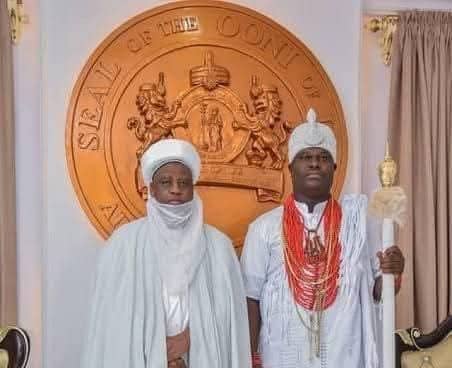A prominent pan-African sociocultural group has thrown its full support behind the proposed legislative bill to formally recognize the Ooni of Ife and Sultan of Sokoto as the paramount custodians of Nigeria’s cultural and traditional heritage.
The African Sociocultural Harmony and Enlightenment (ASHE) Foundation made the endorsement in a strongly worded statement signed by its president, Prince Justice Faloye, urging lawmakers to uphold what it describes as a long-standing civilizational order that colonialism sought to dismantle.
The bill, currently under deliberation at the National Assembly, aims to grant the two revered monarchs official recognition as the highest authorities in Nigeria’s sociocultural and traditional affairs—a move that has sparked both support and controversy across the country.
ASHE argues that the leadership roles of the Ooni of Ife and Sultan of Sokoto are not political appointments but deeply rooted in history, genetics, and shared cultural values that define two major African civilizations.
In its statement, ASHE asserted that the greatest damage of colonialism was not political domination but “de-civilization”—the erasure of Africa’s civilizational identity and the fragmentation of its people into artificial tribes.
“The most strategic and enduring damage inflicted by colonialism on our collective psyche is our decivilization,” Faloye stated. “Coloniality of knowledge wiped from our memory the natural progression from family to clan, to tribe, to civilization, and finally to universalism.”
The foundation identified four major world civilizations: White Judeo-Christian, Islamic Afro-Asiatic, Buddhist Asian, and the indigenous African civilization centered on the Ifa-Afa-Iha-Efa 16-sector knowledge system, most institutionalized in Ile-Ife.
According to ASHE, Nigeria is composed of two dominant civilizational blocs:
The Indigenous African Civilization, led by the Ooni of Ife
The Islamic Afro-Asiatic Civilization, led by the Sultan of Sokoto
“This is not a matter of preference,” Faloye emphasized. “History, cultural ties, and even genetic evidence from institutions like Harvard University confirm that the Yoruba possess the most indigenous African DNA, while the Fulani carry the highest Asiatic genetic markers—both aligning with their civilizational identities.”
ASHE cited multiple historical and spiritual validations for the Ooni’s leadership, including the declaration by the Eze of Enugu in 2019 that “if all Africans were Catholic, the Ooni of Ife would be the Pope.”
It also noted that all Obi crowns in Igboland trace their lineage to Oduduwa, whose name in Igbo—Odu d’uwa—means “spiritual leader of the world.” Similarly, the Edo monarchy and the Ijaw progenitor, Ojo/Ujo, are historically linked to earlier rulers of Ile-Ife.
For the Sultan of Sokoto, ASHE highlighted his role as the head of the Maliki school of Islam, one of the five major regional Islamic authorities globally. It traced the evolution of Afro-Asiatic rule from the Bornu-Kanem Empire to the Fulani caliphate, noting that neither the Etsu of Nupe nor the Shehu of Bornu has ever challenged the Sultan’s civilizational leadership.
The foundation blamed British colonial rule for deliberately weakening the unifying influence of the Ooni while elevating the Sultan’s authority to serve its indirect rule strategy.
“The British extended the North below the Niger into Yoruba and Tiv lands, placing diverse groups under the Sultan’s indirect rule,” the statement read. “Meanwhile, they fragmented the South, suppressing the Ooni’s influence to prevent unity among the Yoruba, Igbo, and other indigenous African groups.”
This administrative divide, ASHE argues, has perpetuated ethnic rivalry and political instability in post-independence Nigeria.
ASHE stressed that the proposed council of monarchs should remain non-partisan and focused on cultural stewardship. It urged the inclusion of traditional rulers in the constitution as permanent stakeholders in national development.
“Only traditional rulers, as moral and cultural custodians, can restore ethical integrity to institutions like INEC and hold short-term politicians accountable,” Faloye said.
The group dismissed claims that the bill is a political ploy for the 2027 elections, calling such allegations “a feeble excuse” given that monarchs have always been individually courted by politicians—but never united as a civilizational bloc.
ASHE concluded that organizing Nigeria’s over 300 ethnic groups into two civilizational frameworks—based on shared origins and values—is not only logical but essential for national cohesion and development.
“The lack of civilizational identity robs us of strategic alliances and hinders economic progress,” it stated, referencing development economics theories on ethnic fractionalization.
“The Ooni of Ife and Sultan of Sokoto are not competitors. They are custodians of two great African traditions. Recognizing their roles is not a step backward—it is a leap toward true cultural restoration and national unity.”
Follow us on Instagram
https://www.instagram.com/businessnewsng?igsh=ZXpweTdjOGF1ZXdu





















